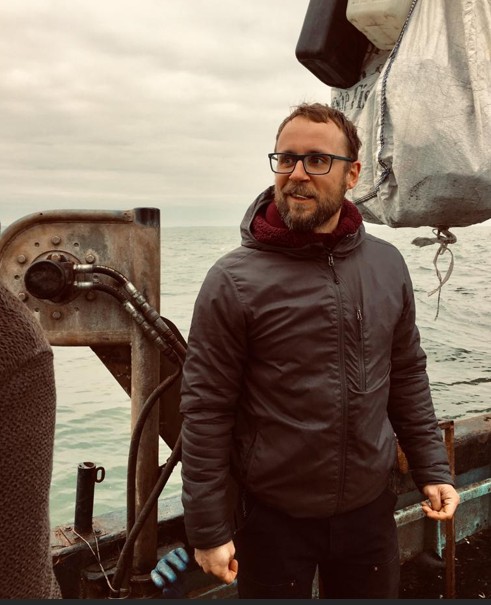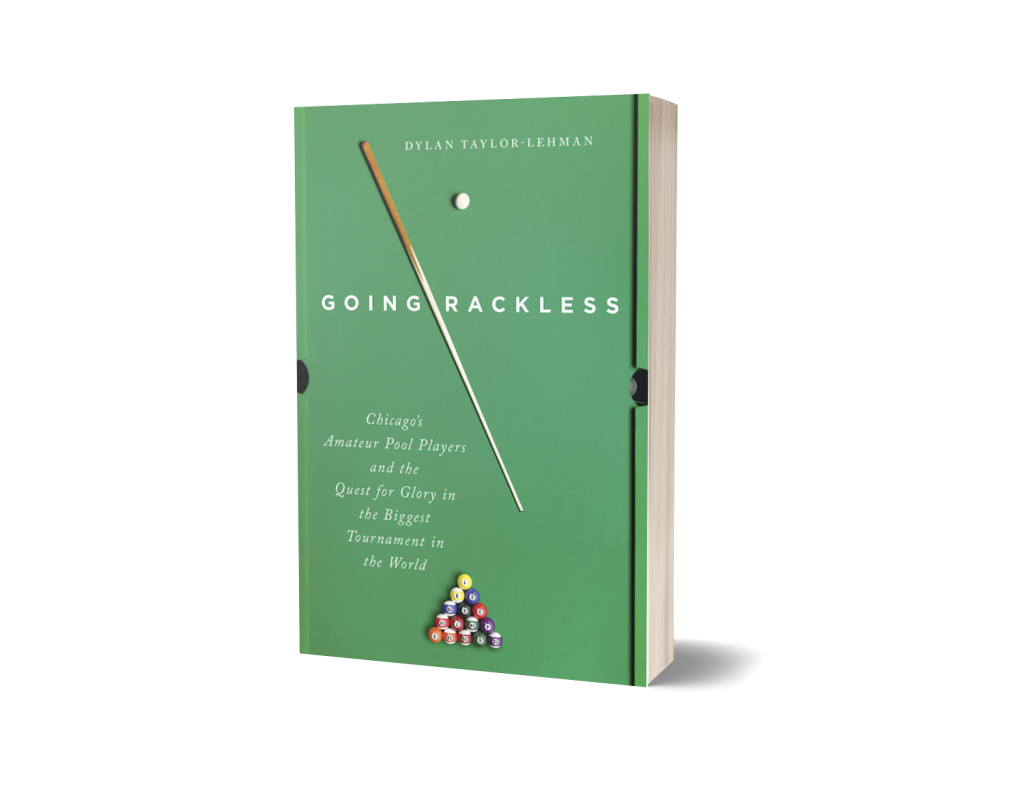Dylan Taylor-Lehman, author of Going Rackless: Chicago’s Amateur Pool Players and the Quest for Glory in the Biggest Tournament in the World, answers questions about his new book.
Q: Why did you decide to write this book?
I had just spent some time working on a number of articles about true crime and other hard-hitting topics and was looking for something a little more light-hearted to dive into. I’d always loved shooting around and had recently started playing pool on the crappy breakroom pool table at my job at the time and realized it might be fun to explore the world of pool. I found out there were a number of amateur leagues in Chicago that were competing to play against other teams around the country in the biggest tournament in the world, which is in Las Vegas each year. I started nosing around Chicago’s pool halls not long after and a number of teams and league personnel were kind enough to take me under their wings; given the history, thrills, and passion, it wasn’t long before the article I was hoping to write turned into a full book.
Q: What is the most interesting discovery you made while researching and writing your book?
I guess that being good at pool is even harder than I realized! That was one of the downsides of being around so many incredible players – they helped me understand what I technically and strategically be doing during a game but that only made me all the more frustrated when I couldn’t pull off a shot!
But seriously though, learning about the underground hustling history of Chicago but also the positive role pool could play in neighborhoods and communities really helped personalize the game and give it a bit more cultural heft than I realized. Seeing just how much the game means to the amateur players I spent time with was inspiring, impressive, and even heartwarming – who knew that so many lives, professions, and even relationships are based around pool?
On the other hand, I was also surprised to realize how un-lucrative it is to be a professional pool player, as the topmost players in the world make approximately $150,000 annually playing pool. Not that this isn’t impressive, as fun as it would certainly be fun to play pool for a living, but it’s definitely not pro baseball money.
Q: What myths do you hope your book will dispel or what do you hope your book will help readers unlearn?
The image of a down-on-his-luck pool player smoking a cigarette in a dive bar possibly connected to criminal enterprises is a pretty standard stereotype of a serious pool players – my book will not dispel that myth because the history and development of pool was written by these hardcases, especially in Chicago, and are still plenty of those dudes around keeping the old-school spirit alive. But that of course is what makes the game and culture of pool so rich, and I’m happy the book showcases this side of the sport.
But in terms of dispelling myths, I was personally quite impressed with the depth of strategy the game requires and I hope readers come away with a newfound respect for what playing pool entails. I also realized just how accessible pool is – you don’t need to be young or athletic to play; anyone can put in the work to become a good shooter and discover a new side of themselves in the process.
Q: Which part of the publishing process did you find the most interesting?
My experience working on this book was a bit different than my other two because the publishing process required two rounds of reviews by scholars and writers to make sure my theme and approach were sound. While I am used to being reviewed/edited, the people who reviewed my manuscript wrote lengthy assessments about my project, which were both a bit nerve-wracking and very helpful to read, plus I appreciated being able to read at length about myself haha. Fortunately I met their approval and the positive quotes they provided for the book were quite flattering to read.
Q: What is your advice to scholars/authors who want to take on a similar project?
Easily the most fun part of the experience was being on the scene at the pool halls and tournaments. The reason I write nonfiction is because I like going out and seeing things and talking to people and doing extensive research in libraries and archives. I can’t imagine anyone would write a nonfiction book without spending a ton of time on the scene in person, so assuming that a ton of “fieldwork” is inherent in one’s project, it is very important to try to genuinely interested, respectful, and casual when hanging out with the people you’re writing about. In essence, be cool and have fun – try to relax, join in the jokes, and generally don’t seem too much like you’re a cultural anthropologist (even though writing in a notebook while you talk to someone does give this vibe). People like talking about themselves and are flattered you’re interested in what they’re doing, so being sincere about learning what they’re into – and not treating people like they are characters or are doing you a transactional favor – will go a long way and open a lot of interesting and unexpected doors.
Q: What do you like to read/watch/or listen to for fun?
Reading: While I used to read as wide of a variety of novels as possible (and I’m currently almost finished with my third of fourth re-read of Maj Sjowall and Per Wahloo’s Inspector Beck series, I mostly only read longform nonfiction. Some recent highlights include Mind of a Bee by Lars Chittka, Nuclear War: A Scenario by Annie Jacobson, The Riddle of the Labyrinth by Marguerite Cox, and of course a steady stream of my favorite writers of all time – Joseph Mitchell and Gay Talese.
Listening: I am a huge metalhead and am constantly listening to the most stridulous music imaginable, from brutal death metal to ultra brutal death metal and from goregrind to grindcore. Of course, when other people are around and not trying to be needlessly annoyed, I’ll tone it down a bit and enjoy something a little more palatable, from Ethiopian jazz to jarocho to trap to EDM. Watching: I’m fairly indifferent toward film and TV and so for the most part the only movies I’ll take the time to watch are heist/crime movies and mockumentaries by Christopher Guest.

Dylan Taylor-Lehman is a journalist and writer and the author of Sealand: The True Story of the World’s Most Stubborn Micronation and Its Eccentric Royal Family and Dance of the Trustees: On the Astonishing Concerns of a Small Ohio Township.

